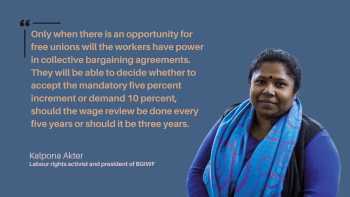EU law offers hope, challenges for labour rights in Bangladesh

The proposed European Union law requiring large companies to prevent and remedy human rights and environmental abuses in their global supply chains is a step in the right direction. Now, depending on how it is implemented, it can add great value especially for a country like Bangladesh, which is mainly a country of production factories. If the proposed law contains cost continuity for any improvement—meaning that any cost improvement suggested in the legislation will be borne by both the buyer and seller, as the factory owners can't pay for all of it themselves—then that might be of great value.
What we want besides this is access to remedy. In case the brands or manufacturers in our country are not following the directives, if they fail to apply the directives or clauses, then there should be room for remedy. If the access to remedy is included along with financing, for example, to hire a lawyer, then that would be phenomenal.
The EU's law adaptation will, at least in some parts, translate to changes of law in Bangladesh as well. For example, we don't have any laws regarding living wages and that is something which could be adopted because of the law. We will be able to understand the gravity of changes that will be necessary once the law passes in its full form and we receive the finalised document.
A worker having to protest to receive their hard-earned wage after months is shameful for an industry. A worker does their work and should get paid in due time. This should be a black-and-white matter with no ifs, ands, or buts.
But why is it that Bangladesh can't independently create a legal framework that protects workers' rights? Why do we have to rely on the EU or the West for this? This is because our current laws and perspectives are such that profit is prioritised over people. But, ideally, it should always be people over profit. The betterment or security or the rights of people should never be second to the profits of business enterprises. The same goes for the environment, which is also never considered as being more important than profits.
Existing labour laws can be said to be laws to exploit labourers. The names of the laws themselves are indicative of who the law is for. We cannot hope to achieve a legal environment that is protective of the labourers when businessmen are running the country. Of course they are going to protect their own interests before anything else and not think of other people who have stakes in this business or industry, or about their interests or rights which should be upheld and protected.
Even in Europe, to be honest, and considering how old its industries are and how developed they are economically, a law like this should have been adopted a long time ago. They have done enough against the environment and against workers. The law we're talking about right now was introduced five years ago. It took five years for it to come to this state, and even now it is yet to be finalised and implemented.
Let's talk about the laws we already have. The state of implementation in terms of our existing laws is severely weak. If the current laws had been implemented properly and there was transparency and accountability, our workers would probably not be as exploited and oppressed as they are.
There are two reasons as to why the existing laws are not implemented properly. Firstly, there is a scarcity of resources and knowledge available to those who are responsible for the laws' implementation. Secondly, even if we set aside questioning the sincerity of those who are responsible for implementation, the truth is that they will never be uninfluenced even if they wanted to realise the laws. They will either be bribed, threatened, or be managed in any way necessary, by the owners who hold power.
In Bangladesh, changes following the EU law can be both short-term and long-term, depending on the final elements of the law. The living wage element, for example, will not be possible to implement within a day. But the safety aspects outlined in the law can be implemented swiftly because these already exist in the public and private sectors. So it will not be unrealistic to create a safe working environment on a short-term basis. Forced labour, on the other hand, will not go away as quickly. But then again, child labour is not impossible to end because it is directly connected with the living wage. Children go to work as labourers because their parents don't earn enough to sustain the family. So until we have a minimum living wage, child labour won't go away.
Carbon emissions, on the other hand, will always be a long-term issue due to the adaptation procedure, especially in terms of results. But implementing a just transition mechanism (JTM), which includes ensuring sustainable production and securing workers' rights, is doable right now provided that the funds necessary for adaptation are allocated. We must be conscious of this. It is not possible to adopt JTM without the funds being provided. So, only instructing to adopt the just transition is not enough. If the funds for this transition are provided, it can be adapted immediately worldwide as there are enough laws and directives on how to adopt it.
Then there is the important matter of access to remedy, though we don't know how long it will take for us to get that. For now, at least an avenue has been created to access remedy. And this was necessary.
A common situation we see among workers is them demanding payment of their arrears. Not paying workers in due time is not only a violation of labour laws, but it is a violation of human rights. If a factory has 1,000-5,000 workers, they should pay their workers within the first five days of every month. And if it has more than 5,000 workers, they should pay wages within the first eight days of each month. But as we know, this is not always followed. Some major factories and companies in our country do follow it, but most of the subcontractors and smaller factories never follow these rules. A worker having to protest to receive their hard-earned wage after months is shameful for an industry. A worker does their work and should get paid in due time. This should be a black-and-white matter with no ifs, ands, or buts.
Now, whether there will be any changes in this aspect due to the European Union's adaptation of the new law depends on some factors. Firstly, the big companies work with major factories. It is usually the subcontracting factories which commit violations such as not paying regular wages. In this regard, we may see the big companies trying to skirt responsibility by saying that they did not know that such subcontractors had been hired. Or that they had assigned the work to the main factory, and that the main factory had hired the subcontractor for additional assistance. This tells us that, if this sort of excuse for non-payment of workers' wages is seen in the future, then both the brand and factories must be held accountable.
Kalpona Akter is a labour rights activist and president of Bangladesh Garment and Industrial Workers Federation.
Views expressed in this article are the author's own.
Follow The Daily Star Opinion Facebook for the latest opinions, commentaries and analyses by experts and professionals. To contribute your article or letter to The Daily Star Opinion, see our guidelines for submission.

 For all latest news, follow The Daily Star's Google News channel.
For all latest news, follow The Daily Star's Google News channel. 











Comments